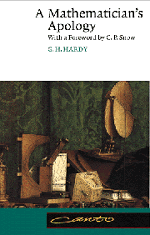Summary
IF intellectual curiosity, professional pride, and ambition are the dominant incentives to research, then assuredly no one has a fairer chance of gratifying them than a mathematician. His subject is the most curious of all—there is none in which truth plays such odd pranks. It has the most elaborate and the most fascinating technique, and gives unrivalled openings for the display of sheer professional skill. Finally, as history proves abundantly, mathematical achievement, whatever its intrinsic worth, is the most enduring of all.
We can see this even in semi-historic civilizations. The Babylonian and Assyrian civilizations have perished; Hammurabi, Sargon, and Nebuchadnezzar are empty names; yet Babylonian mathematics is still interesting, and the Babylonian scale of 60 is still used in astronomy. But of course the crucial case is that of the Greeks.
The Greeks were the first mathematicians who are still ‘real’ to us to-day. Oriental mathematics may be an interesting curiosity, but Greek mathematics is the real thing. The Greeks first spoke a language which modern mathematicians can understand; as Little-wood said to me once, they are not clever schoolboys or ‘scholarship candidates’, but ‘ Fellows of another college’. So Greek mathematics is ‘permanent’, more permanent even than Greek literature. Archimedes will be remembered when Aeschylus is forgotten, because languages die and mathematical ideas do not. ‘Immortality’ may be a silly word, but probably a mathematician has the best chance of whatever it may mean.
- Type
- Chapter
- Information
- A Mathematician's Apology , pp. 80 - 82Publisher: Cambridge University PressPrint publication year: 1992

